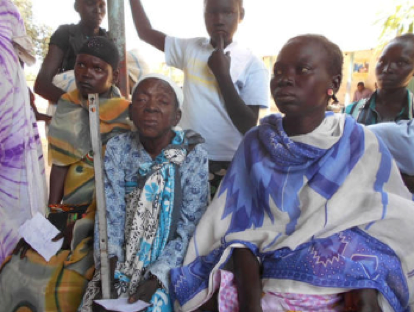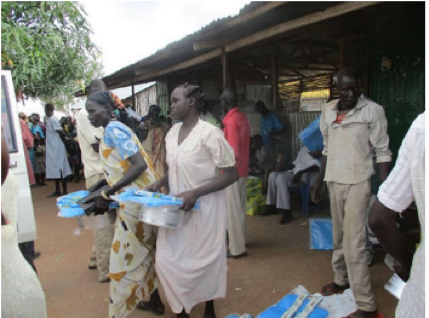– People are still waiting for international aid –
[Original by Takaki IMAI, Manager for Humanitarian Assistance and Peace-Building Group (December 5, 2017); Translated by K. Adachi]
I went to Juba in South Sudan on November 23, 2017, listened to the internally displaced people in refugee camps, and gave medical and educational aid. I will report the local situations and our activities in this series, “The Diary from South Sudan.”
The 1st day: 23rd of November (Thursday)
Arrival in Juba
When I got off the plane, local young guys who are not even airport staffs cut into around immigration counter for entry procedures and I was violently jostled. They appear to speak to foreigners when they find foreigners, and they made advance to me as well and told “how many baggage you have? I’m going to seek and take it” then they tried to deprive me of the receipt of baggage. The purpose is to get “commission”. They are more aggressive than before. Everyone is desperate to obtain the cash as much as possible.
I managed to get out from the airport and moved to the city by the car came for pick up. I hadn’t been to Juba in 4 months, since July this year. Apparently the status of city hadn’t changed in particular.
First of all, I went to the maintenance factory of South Sudan Church Council (SSCC) where JVC carried out the business of training for the vehicle maintenance before. At present, we borrow the space for JVC South Sudan office inside factory.
Ms. Dodo, who is in charge of accounting, grumbled “Nothing but the cost of living has risen and we cannot even buy beans for trainee’s lunch” although the mechanic training is still continuing now. “It cannot be a lunch without side dishes…”
Buying just the staple foods of maize and rice already takes up the budget. The cost of living has doubled and it is striking the daily life of people. The people who are most affected are those who cannot obtain regular jobs and single-mother households as is the case with many refugees. Women are looking for jobs of helping households such as washing and doing the dishes in the market, but the standard wage of the day labor job is around 150 SSP (South Sudanese Pounds, current exchange rate is 1 USD = 190 SSP). By this amount, they can buy only 1 cup of corn flour for staple food. That cannot be the food expense for 1 day of the family.
Activity plan during the stay
I had a meeting with Nakang Christine who is the JVC local coordinator about the schedule of my stay this time.
<Support for medical supplies>
Many domestic refugees are living in or out of camps in the Gumbo area of eastern shore of the Nile River. We carried out about three month’s medical supply supports for the clinic in this area in November last year. When I visited again in July this year, I discovered that the supply of medical supplies was not provided from the government nor other aid organizations after that, and the situation of the shortage of medical supplies hadn’t changed. This time we were planning to continue the support for this clinic.
<Support for attending school>
This was the main activity of the business trip this time. There are 600 families in total living in camps (Camp 1 and Camp 2) in the Mangaten domestic refugee camp in suburb of Juba. JVC carried out the food aid in April and daily commodities aid in August this year. Through the activities so far, it was figured out that there are many children in the camp who are not attending schools or children who are attending schools but cannot study because they don’t have school goods. This time we were going to support school supplies for school children and pre-school children.
<Aid for living improvement of women>
This is the new activity we are planning in the Mangaten domestic refugee camp from this year through next year. We are going to discuss with women about how female refugees can obtain even a little cash income, can make a living by themselves but not by the distribution of the goods, and we were going to carry out necessary supports. This time we began by holding the place of discussion.
Christine suggested the following activities to improve their income and living: cafe on the street (many women are engaged in Juba), sawing, vegetable cultivation in house gardens, and sales of confections such as fried breads in the market. The first step is to talk with women in the camp and to let them come up with specific ideas such as “we can do this” or “we have already been doing.”
The 2nd day: 24th of November (Sunday)
Visit the office of Caritas Juba parish
We have carried out supports for clinics etc. so far in cooperation with the Caritas Juba parish office. Caritas is supporting several clinics around Juba. This time as we were planning the support for medicines to the Gumbo clinic, they said “it is a good idea” and it was decided that they would attend when the medical supplies were to be delivered.
Gumbo clinic
I crossed the Nile River and went to Gumbo area on the opposite shore. There is the clinic when you drive for a while after crossing the bridge. Although many patients were waiting and it appeared busy today too, Dr. Remo took his time out of his medical examinations in order to meet with me.
“I was waiting for you.”
He told me so as soon as he saw my face.
“I was asked many times by our patients when that foreigner and organization would come next.”
All of medical supplies we supplied last time was consumed at the beginning of this year. After that 40 boxes of antipyretic were sent from Health Ministry but he said “they disappeared in only one day”. Except for that, they hadn’t received medical supplies aid. The number of examinees in the clinic is about 200 people a day. This number hasn’t changed from when we came here last November.
Mothers were waiting for their turns in front of the consultation room, saying “the fever of baby doesn’t back to normal” or “all three children are infected with malaria.” When I asked them to tell about the clinic, they replied:
“There were little medicines in this clinic until several months ago but there is almost nothing at this moment.”
“While waiting after receiving the receipt of acceptance, I was once told by another patient ‘there is no medicine today’ and I have to go back home without even having a medical examination.“
“If I take only paper (prescription) here, I cannot buy medicines in the pharmacy because it’s expensive.”
“There are other clinics in Gumbo area but medicines are charged there. If I cross the river and go to Juba city where there are public clinics, I might be given medicines for free but it’s impossible because a bus fare is charged.”

Goods distribution in Camp 2 in August 2017. We supplied mosquito nets, soaps, and cooking utensils.
Buying medicines in the pharmacy costs hundreds of SSP. Some medicines cost more than 1,000 SSP. Under the circumstances only about 150 SSP can be earned by day labor, it’s too expensive price to buy. Dr. Remo gave us the list of necessary medicines for the clinic. Based on that, we decided to take quotations from three wholesalers of medicines in Juba.
The occasion broadcasting about South Sudan has been greatly diminished in Japan after the Self-Defense Forces was withdrawn, but the situation requires the aid hasn’t been resolved.
I will report on my visit to the Mangaten refugee Camp 1 next time.
Share This:
